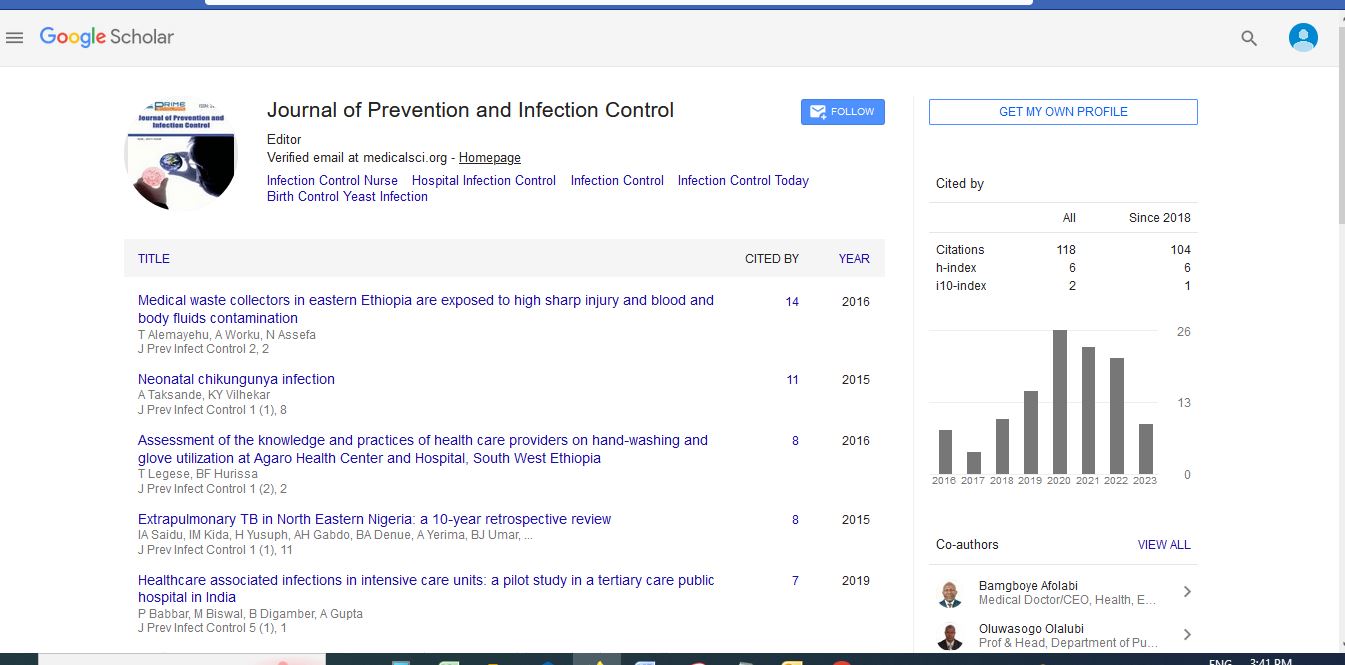Commentary - (2024) Volume 10, Issue 2
The Power of Vaccination: Safeguarding Health and Building Immunity
Jing Zhao*
Department of Medical Science, Wuhan University, China
*Correspondence:
Jing Zhao,
Department of Medical Science, Wuhan University,
China,
Email:
Received: 29-May-2024, Manuscript No. IPJPIC-24-20115;
Editor assigned: 31-May-2024, Pre QC No. IPJPIC-24-20115 (PQ);
Reviewed: 14-Jun-2024, QC No. IPJPIC-24-20115;
Revised: 19-Jun-2024, Manuscript No. IPJPIC-24-20115 (R);
Published:
26-Jun-2024, DOI: 10.36648/2471-9668-10.2.14
Description
Vaccination stands as one of the most effective public health interventions
in human history, saving millions of lives and preventing
countless cases of illness and disability. Vaccination is the administration
of a vaccine to stimulate the immune system against
specific diseases. It helps prevent infections and provides immunity,
reducing the severity and spread of illnesses. By stimulating
the body’s immune system to recognize and fight off harmful
pathogens, vaccines play a crucial role in protecting individuals
and communities from infectious diseases. In this article, we explore
the significance of vaccination, its impact on public health,
and the importance of vaccine education and access. Vaccination
is essential for preventing the spread of infectious diseases and
reducing the burden of illness on society. Through vaccination
programs, many once-common diseases, such as polio, measles,
and smallpox, have been virtually eradicated or significantly
reduced in prevalence. Vaccines not only protect vaccinated
individuals from disease but also contribute to herd immunity,
wherein a sufficient proportion of the population is immunized,
providing indirect protection to those who cannot be vaccinated,
such as infants, the elderly, and individuals with weakened immune
systems. Vaccination has had a profound impact on global
public health, leading to dramatic reductions in morbidity and
mortality from vaccine-preventable diseases. By immunizing
individuals against diseases such as measles, mumps, rubella,
diphtheria, tetanus, and influenza, vaccines have saved millions
of lives and improved overall well-being worldwide. Vaccines
work by stimulating the immune system to produce an immune
response against specific pathogens, such as viruses or bacteria.
They contain weakened or inactivated forms of the pathogen,
parts of the pathogen, or synthetic antigens that resemble the
pathogen. When administered, vaccines prompt the body to recognize
these antigens as foreign invaders and mount an immune
response, including the production of antibodies and memory
cells. The immune response generated by vaccination primes the
body to recognize and rapidly respond to the pathogen if encountered
in the future. This provides long-lasting protection against
the disease, reducing the severity of illness and the likelihood
of transmission to others. Despite the overwhelming scientific
evidence supporting the safety and efficacy of vaccines, misinformation
and misconceptions persist, leading to vaccine hesitancy
and refusal in some communities. Debunked myths about
vaccines causing autism, infertility, or other adverse effects continue
to circulate, undermining confidence in vaccination efforts.
Addressing vaccine misinformation requires proactive education
and communication efforts to ensure that individuals have access
to accurate, evidence-based information about vaccines
and their benefits. Healthcare providers, public health agencies,
and community organizations play a crucial role in disseminating
reliable information, addressing concerns, and fostering trust in
vaccination. Access to vaccines remains a significant challenge in
many parts of the world, particularly in low- and middle-income
countries. Barriers to vaccine access include financial constraints,
inadequate healthcare infrastructure, logistical challenges, and
vaccine distribution inequities. Ensuring equitable access to vaccines
requires collaborative efforts from governments, international
organizations, pharmaceutical companies, and civil society.
Initiatives such as the COVAX facility aim to facilitate the equitable
distribution of COVID-19 vaccines to countries regardless
of their income levels, helping to bridge gaps in vaccine access
and promote global health equity. Vaccination is a cornerstone
of public health, offering protection against infectious diseases
and saving lives.
Acknowledgement
None.
Conflict Of Interest
None.
Citation: Zhao J (2024) The Power of Vaccination: Safeguarding Health and Building Immunity. J Prevent Infect Control. 10:14.
Copyright: © 2024 Zhao J. This is an open-access article distributed under the terms of the Creative Commons Attribution License, which permits unrestricted use, distribution, and reproduction in any medium, provided the original author and source are credited.

